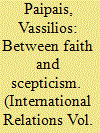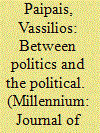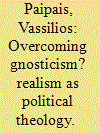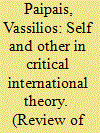|
|
|
Sort Order |
|
|
|
Items / Page
|
|
|
|
|
|
|
| Srl | Item |
| 1 |
ID:
176035


|
|
|
|
|
| Summary/Abstract |
In this essay, I offer a brief assessment of Nicholas Rengger’s engagement with arguments arising from the theological critique of modern politics and of his take on the relationship between faith and philosophy in modernity. Rengger’s scepticism, a peculiar mix of naturalism and philosophical idealism, combining insights from Oakeshott, Santayana and Augustine, did not cordon off faith but sought to work out its tensive relationship with practical forms of reasoning in modernity, a condition he described as a ‘hybrid’. Rengger’s critique of the hybridity of modernity rests on assumptions that expose some of the unresolved tensions of his anti-Pelagian scepticism.
|
|
|
|
|
|
|
|
|
|
|
|
|
|
|
|
| 2 |
ID:
133550


|
|
|
|
|
| Publication |
2014.
|
| Summary/Abstract |
This article situates H. Morgenthau's thought in the context of post-foundationalist theorisations of the difference between politics and the political. In doing so, it shows how Morgenthau's sophisticated realism refused to circumscribe the antagonistic dimension of politics and introduced the study of international politics as a struggle with negativity, temporality and contingency in the wake of the crisis of foundationalism in late modernity. Morgenthau's tarrying with the negative is primarily revealed in his irresolvable tragic oscillation between Nietzschean scepticism and Kantian moralism. Nevertheless, due to its antinomic premises, Morgenthau's tragic vision of politics can still be viewed as stopping a step short of its full-blown critical potential. It is not the purpose of this article, however, to award or withhold credentials of criticality but to recast Morgenthau's theory of the political as an instructive, albeit inconclusive, attempt at a post-foundational political ontology. This may, eventually, serve a purpose far broader than restoring classical realism's latent reflexivity; it may prompt an argument about the conditions and challenges involved in practising international theory as a constant critique of depoliticisation.
|
|
|
|
|
|
|
|
|
|
|
|
|
|
|
|
| 3 |
ID:
153917


|
|
|
|
|
| Summary/Abstract |
This paper takes issue with approaches that relate realist political theology exclusively back to its Schmittian and neo-orthodox roots. While not entirely denying those influences, it argues that realist thought is more accurately described as rooted in the tensions characterizing Augustine's anti-heretic diatribes rather than taking inspiration from Schmittian political theology or the ‘Gnostic’ tendencies in Protestant neo-orthodox theology. Augustine's refutation of both the Manichaean Gnostic and the Pelagian solutions to the problem of evil gave rise to a complex understanding of the relationship between human free will and original sin based on a combination of ontological monism and ethical dualism. Building on this heritage, realists can be read as rehearsing Augustine's ambiguous gesture of overcoming Gnosticism with equally uncertain success. In responding to the modern ‘Gnostic’ challenge in terms that recognized the dialectical tension between ontological monism and ethical dualism, realists such as Morgenthau and Niebuhr should rather be seen as direct heirs of Augustine's ambivalent orthodoxy rather than Schmitt's unorthodox, semi-‘Gnostic’ Catholicism. This intellectual legacy may, then, explain their abhorrence of purist positions in politics—be they quietism, pacifism or, their opposite, political messianism—and adherence to an anti-‘Gnostic’ pragmatism grounded in the tensions of Augustinian theology.
|
|
|
|
|
|
|
|
|
|
|
|
|
|
|
|
| 4 |
ID:
101738


|
|
|
|
|
| Publication |
2011.
|
| Summary/Abstract |
This article is principally concerned with the way some sophisticated critical approaches in International Relations (IR) tend to compromise their critical edge in their engagement with the self/other problematique. Critical approaches that understand critique as total non-violence towards, or unreflective affirmation of, alterity risk falling back into precritical paths. That is, either a particularistic, assimilative universalism with pretensions of true universality or a radical incommensurability and the impossibility of communication with the other. This is what this article understands as the paradox of the politics of critique. Instead, what is more important than seeking a final overcoming or dismissal of the self/other opposition is to gain the insight that it is the perpetual striving to preserve the tension and ambivalence between self and other that rescues both critique's authority and function.
|
|
|
|
|
|
|
|
|
|
|
|
|
|
|
|
|
|
|
|
|